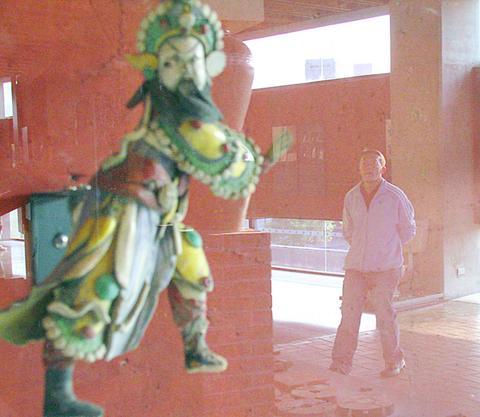Nothing bridges nature and culture more than pottery. That's the idea that the Yingge Ceramics Museum was built on and its permanent exhibits alone make a compelling case for it. Clay was the first thing humans built with and it remains the foundation of the civilized world; from dinner plates to dentures and from engine cylinders to silicon chips.
Now the past two centuries of Taiwan's ceramics history can be seen at the museum in a special exhibition -- 200 Years in Yingge starts today and runs through Saturday, Oct. 30.

PHOTO: DAVID MOMPHARD, TAIPEI TIMES
The cause for the celebration is the arrival in Yingge 200 years ago of Wu An (吳鞍), the first potter from Guangzhou to settle in the area and take up his trade. He was later joined by a brick maker named Chen Kun (陳昆) and the two helped make the area into the center of Taiwan's ceramics industry. Today, Yingge is known as much for the commodes and cable insulators it supplies to the world as for the works of art its craftsmen create.
While a bicentennial is cause to celebrate, there's reason enough to travel to the Taipei County township without it. The Yingge Ceramics Museum is world-class -- not a term usually associated with Taiwan's countless museums -- and the town it sits in has quite literally formed a unique identity for itself over the centuries.
Beginning at the museum, you can learn about the start of Taiwan's ceramics industry, when sampans on the Dahan River floated cups and bowls downstream, and about the prosperous days that came with the railroad. Then you can exit the museum and sift through stacks of plates seven decades deep. You'll be surprised at what you find (locally manufactured Japanese-era rice bowls, for example) and surprised at the cost (NT$100 per piece).
Yingge's history has been captured not only in clay, but through the camera, as well, and the 200-year exhibit's must-see section is Memories of Trains, housed in the town's old train station, next door to the new train station.
Taking the idea that clay bridges nature and civilization a step further, the museum will offer several special activities over the next two weeks as a part of the 200-year anniversary exhibit. A one-day environmental tour of the township will take visitors on a tour of the local incinerator and to a DIY recycling shop. There are also tours of the hundreds of both modern and traditional kilns in the area. Both tours are available weekends only.
The Yingge Ceramics Museum is located at 200 Wenhua Rd, Yinge Township, Taipei County (北縣鶯歌鎮文化路200號). To get there, take the train to the Yingge Railway Station and follow the big green and white signs to the museum and special exhibit centers. The exhibits are open until 5pm on weekdays and until 6pm on weekends. Admission is NT$200. More information about the exhibitions can be viewed on the Web at www.ceramics.tpc.gov.tw.

Taiwan has next to no political engagement in Myanmar, either with the ruling military junta nor the dozens of armed groups who’ve in the last five years taken over around two-thirds of the nation’s territory in a sprawling, patchwork civil war. But early last month, the leader of one relatively minor Burmese revolutionary faction, General Nerdah Bomya, who is also an alleged war criminal, made a low key visit to Taipei, where he met with a member of President William Lai’s (賴清德) staff, a retired Taiwanese military official and several academics. “I feel like Taiwan is a good example of

March 2 to March 8 Gunfire rang out along the shore of the frontline island of Lieyu (烈嶼) on a foggy afternoon on March 7, 1987. By the time it was over, about 20 unarmed Vietnamese refugees — men, women, elderly and children — were dead. They were hastily buried, followed by decades of silence. Months later, opposition politicians and journalists tried to uncover what had happened, but conflicting accounts only deepened the confusion. One version suggested that government troops had mistakenly killed their own operatives attempting to return home from Vietnam. The military maintained that the

Before the last section of the round-the-island railway was electrified, one old blue train still chugged back and forth between Pingtung County’s Fangliao (枋寮) and Taitung (台東) stations once a day. It was so slow, was so hot (it had no air conditioning) and covered such a short distance, that the low fare still failed to attract many riders. This relic of the past was finally retired when the South Link Line was fully electrified on Dec. 23, 2020. A wave of nostalgia surrounded the termination of the Ordinary Train service, as these train carriages had been in use for decades

Lori Sepich smoked for years and sometimes skipped taking her blood pressure medicine. But she never thought she’d have a heart attack. The possibility “just wasn’t registering with me,” said the 64-year-old from Memphis, Tennessee, who suffered two of them 13 years apart. She’s far from alone. More than 60 million women in the US live with cardiovascular disease, which includes heart disease as well as stroke, heart failure and atrial fibrillation. And despite the myth that heart attacks mostly strike men, women are vulnerable too. Overall in the US, 1 in 5 women dies of cardiovascular disease each year, 37,000 of them